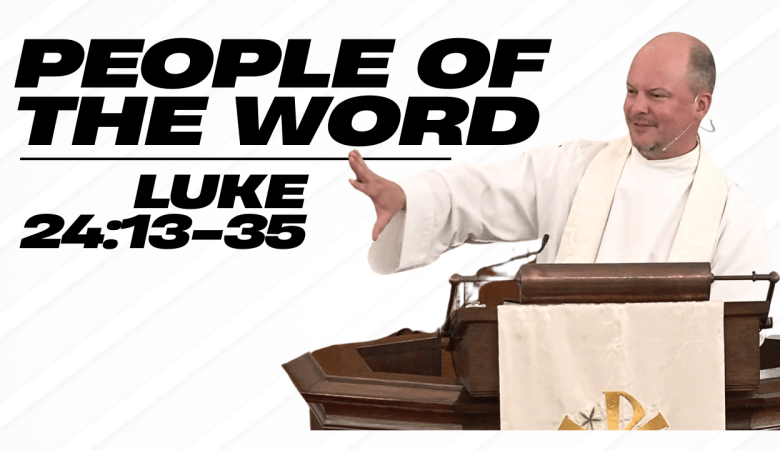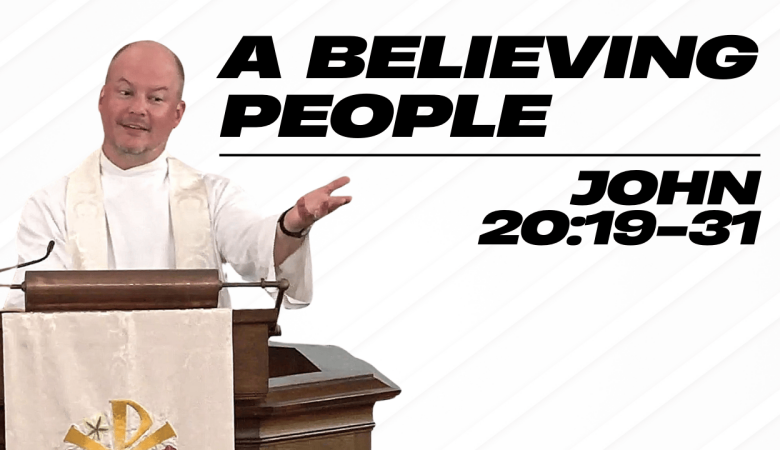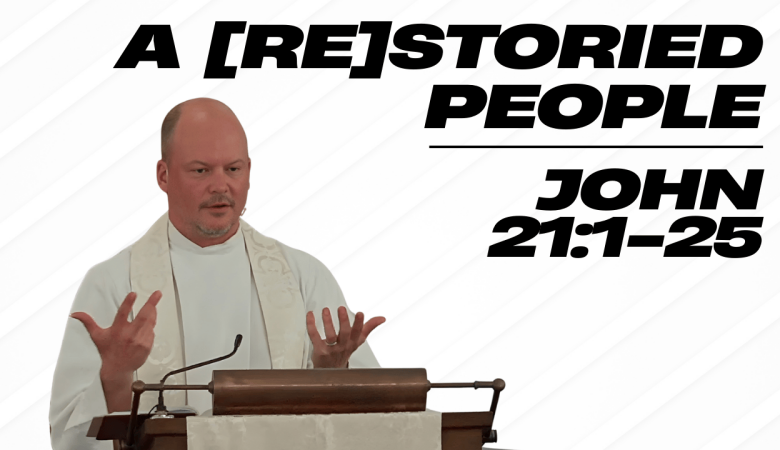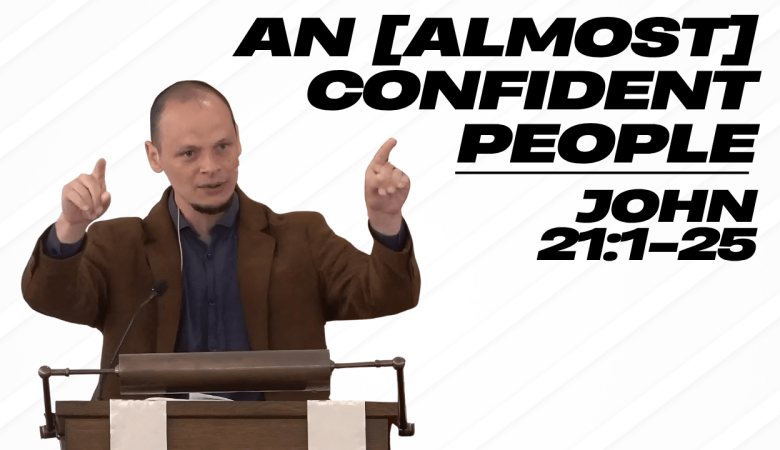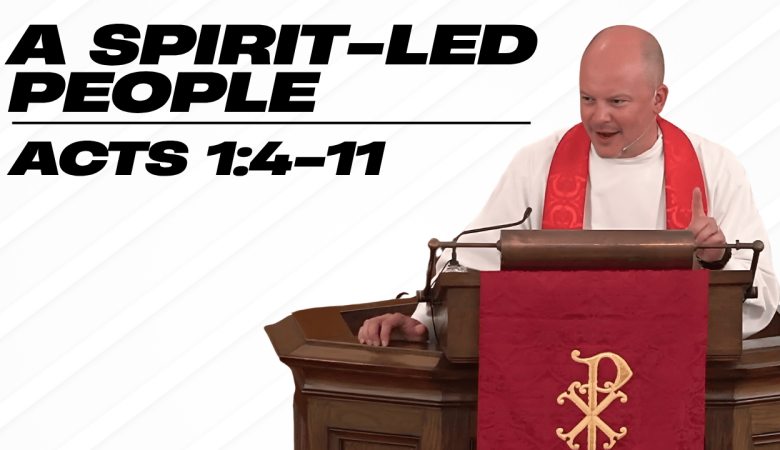Series: Resurrection Narratives
A Missionary People
May 25, 2025 | Peter Rowan
Passage: Matthew 28:16-20
Summary
One of the great post-resurrection texts is the very end of Matthew where Jesus tells his disciples what has come to be known as “The Great Commission.” Yet, what we see in his words is the reiteration of the great covenants of Scripture: The one true God who has authority, working through his people and their obedience to him to bring a blessing to his world. To be the people of God has always been to be a missionary people, a people who live in light of what God has done for them for the sake of the world and his glory in it. To go and make disciples has always been the way of our Missionary God and his missionary people.
Transcript
Opening Prayer
Let's pray again. Lord, as we prayed over our children who are now with us, Lord, we. We ask that you would give us faith, that you would speak to us from your word and that we would know you more, that we'd love you more, that our faith would increase, that it would be our. Our greatest desire to follow you and to go where you would have us go, that we would be those who make disciples eagerly mirror our Lord who goes and makes disciples, who brings good news. Lord, use me now. May the words of my mouth and meditations of all of our hearts be pleasing in your sight, O Lord, our rock and our redeemer. Amen.
Introduction: What Happened to the Apostles?
All right. What happened to the apostles? Y' all ever wonder that maybe some of you know some of the answer to that? Last week we were looking at John, chapter 21, and near the end of that, we talked about how, you know, we got a little glimpse. Jesus talks about the end of Peter's life and how John himself actually spoke about the end of his life and how Jesus wasn't speaking about the end of his life, but the end of Peter's life. And we remembered Aslan's wise words to Erevis at the end of the great Narnian book, the Horse and his Boy Child. I'm telling you your story, not hers. No one has told any story but their own.
And yet, as different as Peter and John's stories were, and as different as all the Apostles stories were, there were themes that ran through them that sort of marked actually every single one of the Apostles. Their themes were this. That ran together all their life. All of their deaths were on mission with God in the world for the mission of God in the world.
Examples of the Apostles' Fates
So let me give you a few examples, okay? Peter, like we saw last week, he was crucified. We have good reason to believe, and the accounts are fairly early on, he was crucified upside down because he did not want to be crucified like his Lord. Under the persecution in Rome under nero around the mid-60s A.D. likely 66.
John, who we had looked at last week, as far as we know, he's actually the only apostle who was not put to death for the sake of the Gospel. He lived until his old age, but he likely lived not there in Israel, in Jerusalem. Of course, after AD 70, when the Romans took over, almost all the Christians fled. But he lived near the end of his life around what would be modern day Turkey and the city of Ephesus. We know this from actually the letters that we have, those little letters that we have in the book of Revelation and the churches that he wrote to right there at the book of Revelation near the end of his life.
John the brother of James was the first. Sorry. James the brother of John was the first to be put to death. Does anybody know who killed James, brother of John? It's in Acts, chapter 12. Kids, do any of you know. Sorry, adults, do any of you know Herod? I heard somebody say Herod. I think a couple of you said Herod. Herod, right there in Acts, chapter 12.
For the sake of his faith, Andrew traveled north. Many people believe that he made it to what would be modern day Russia. But then he was martyred in what would be again, modern day Turkey, Greece. Around that area, Philip went to North Africa. In fact, the tradition has that Philip was preaching and the wife of one of the Roman proconsuls gave her life to following Jesus. She responded to his preaching and the proconsul was so enraged that he had Philip put to death because of his preaching. And someone coming to faith, his own wife coming to faith in Jesus.
Thomas the twin, who we know as Doubting Thomas, by the way. I need to say this because it doesn't fit as much in my. The rest of my sermon, but this is important. Did you notice this little detail in our text that said in some doubted and Jesus still commissions those people? Your doubt does not mean God is not using you. Okay. I mean that there's a real temptation, I think, when we are going through difficult times, but we think that is when maybe we are least useful. It's actually so often when we are most useful in the kingdom. As a side note, but it's a really wonderful little detail.
Anyway, Thomas, Thomas went to probably modern day Iraq, Syria, and then actually people believe that Thomas made it all the way to India. India, started the church over in India. And he, we believe, was killed by four different soldiers for his faith in preaching the good news of Jesus. Nathaniel, it seems like he loved to travel. People think that Nathaniel went with Thomas for a while, but then he went down and kind of ministered along the trade routes between Ethiopia and Arabia. So he was down in North Africa.
The Common Theme
I could go on, but there is a theme that is going on that despite the fact that each of their stories is absolutely unique, like we saw last week In John chapter 21, there are themes that are running through all of them. The theme is they were a going people, a disciple making people, a baptizing people in the name of the Father, Son and Holy Spirit, simply because they were apostolic. They were part of the people of God.
Series Introduction
So we're in this short series in Eastertide, which you know, is from Easter to Pentecost, which it's actually we're going to. In two weeks, we're going to look at how Pentecost is related to this. And we're looking at these narratives, these post resurrection narratives of Jesus with his disciples. We're just asking this question, what do these narratives mean for us? How do they shape our identity as a church? What does it mean to be part of the resurrection people?
The Great Commission
Today we have another of the famous stories of Jesus after his resurrection with his disciples. And of course, this story, this little narrative here, this little teaching we have here is known as the Great Commission. The Great Commission. Adolf Harnack, who was a church historian, theologian, German church historian, theologian, end of the 18th century, early, sorry, 19th century, early 20th century, he wrote this. One cannot say anything greater or more in 40 words than what Jesus says right here.
And while there's so much that we could say about this passage, again I'm trying to focus us on these narratives of what does it mean for us as an identity? Like how is it shaping us as who we are? And I think one of the things that's interesting is that when we come to this passage, I want to say this to you this morning. This is going to kind of be my main thing. There's nothing new here in a way, and yet there's something radically different, which is to say this text is shaping the people of God in a way that they'd always been shaped. And yet there's an enormous change. Why do I say that?
Covenantal Structure
Here we have in the Great Commission, the basic structure of biblical covenants, which was the relationship that God had with his people. Right. The covenants, I've told you before, is a binding relational commitment and promise. And what is that basic structure? Well, first there's the introduction of God. Normally that's actually the Lord. In the Old Testament, Yahweh is proclaimed. But specifically, when you come to a covenant, it's who has the authority and who's the relationships. Who's the one primarily making the covenant? Who's the main party? And Jesus, the first thing he says is all authority's been given to me. He's establishing the parties in a way, all authority. I'm the Lord, the king.
Now the second part is there's these imperative demands of the relationship. Now here it's this. Make disciples, baptize and teach them to obey everything I have commanded. That's a key part of covenant the stipulations of the covenant, the imperative demands. And then there's this third section, which is also, also throughout, which is blessing. Blessing which is most often communicated by saying, I am with you. The presence of God with his people. I'm with you always, even to the end of the age.
So what I'm suggesting to you is that the Great Commission is taking on this basic structure, which was true of all of God's dynamics with his people. When they understood who they were, they understood themselves as being in covenant with God. And these things existed in those covenants. So the Great Commission is making good on the covenants between God and his people. And here's what I want to say subsequently. This is what I want to sort of argue this morning. In a way. The covenants are always forming. A missionary people always. The people of God always had a missionary identity.
Old Testament Covenant Overview Introduction
So here's what's going to be a lot of the sermon this morning. We are going to do an overview of the Old Testament covenants quickly, which is a lot to do. Okay, let's start with Noah. We'll get to Adam after a little while. Let's look at Noah. If you have your Bible open, would you open it? Or if you want to grab that one in front of you, to Genesis, chapter nine. Genesis is the very first book. Genesis, chapter nine.
The Noahic Covenant
If you remember the story, you'll remember that clearly God has all authority. Of course, he has actually just commanded the rain and rain to begin and to stop. His authority has been clearly established. But also you see here in verse 8 that he establishes this covenant. Then God said to Noah and to his sons with him. It's he that is speaking. He's the one who is authoritatively engaging with this covenant here. Behold, I establish my covenant with you and your offspring after you and with every living creature that is with you, the birds and the livestock and every blah, blah, blah, blah. We keep going.
And one of the things that we actually looked at this fall is when you come to the Noahic covenant, what you see is this retelling of this story that God is committed to his entire creation. That is a key thing in understanding the Noea covenant, that God is committed to his entire creation. And that's why actually in verse one and verse seven, the imperative command is a restating of the comparative command to Noah, Be fruitful, multiply, fill the earth. There's always this earth kind of wide scope at play here. All of the earth is to be under the lordship of God.
I want you to think with me about how this covenant is not just for the sake of Noah. It's not even remotely just for the sake of Noah. It's for the birds and the fish and the sea and all of it. The scope of the Noah covenant is the entirety of. Of creation. All of it. Okay, that's fairly quick.
The Abrahamic Covenant
Let's go to Abraham. Turn the page with me. Go to chapter 12. There's a number of places that we could look, and we'll look at one more. But there's a number of places that we could look to consider the Abrahamic Covenant. But I want to say that this is not just a covenant for all of creation, but this is a covenant of mission, specifically of blessing. Okay? A covenantal mission of blessing.
So what you find here again is the parties involved in this Covenant. Immediately. Verse 1 there, it says, now the Lord said to Abram, right? He's establishing himself as the one who is speaking, who is creating the covenant. And the parties here are involved. Abraham, Abram. And he says, go from your country and your kindred and your father's house to the land that I will show you. There's an imperative. And I will make of you a nation. And I will bless you and make your name great and so that you will be a blessing. There's that blessing.
By the way, I didn't mention the blessing in chapter nine. It's there also. But you have this, this blessing of this threefold structure. Again, who's. Who's in charge? What's the imperative? Then there's the blessing right there in chapter 12. But specifically it says this, right? I will bless those who bless you, and him who dishonors you, I will curse, and in you I will. All the families of the earth shall be blessed.
Again, the scope of the Abrahamic Covenant is not just Abraham and his people. It was never intended to be just Abraham and his people. I'll just call you to myself and we can just kind of have a little holy huddle here. That's not how it works. It's never how it works. The scope is all of the nations of the earth. Just like the scope of the Noahic covenant was the entire created reality of what God had done in creation initially.
Now, I did say that there's a lot of different interesting passages that we could look to in looking at the Abrahamic Covenant. But if you actually turn to chapter 18. Gosh, I forgot to actually write down which verse I was wanting you to see here. I wrote it down here. Says, for I have shown this is the Lord speaking. For I have chosen him. Abraham, that is Abraham, that he may command his children and his household after him to keep the ways of the Lord by doing righteousness and justice. That's the ethics. So that the Lord may bring about to Abraham what he promised. He's saying, okay, the commands are connected to the blessing of what I've promised, which is the blessing of the nations. And this is reiterated again and again. I'm just showing you one place in which this is said again. But what I'm suggesting to you is, again, this covenant is created for the sake, not of just one person, or not just him and his family, or him and his holy huddle, but for the entirety of the nations.
The Mosaic Covenant
If we come to the Mosaic covenant, what we see is a covenantal mission of presence and holiness. That's Exodus 19. Okay, we heard this from Don, but if you turn Exodus is the second book in your Bibles. Exodus 19. I'm going to read for you again what Don, read for us. This is Exodus 19, verses 4 to 6 says this, by the way, this is when God had called his people there at the base of Mount Sinai. This is sort of the narrative that surrounds the covenant, the creation of the covenant, the Mosaic covenant at Mount Sinai. Okay, Verse four. You yourselves have seen what I did to the Egyptians, and how I bore you on eagle's wings and brought you to myself. That's the establishment of, again, who's an authority here.
Now, therefore, if you will indeed obey my voice and keep my covenant, there's those covenantal obligations, these imperatives. You shall be my treasured possession among all the peoples, a blessing for all. The earth is mine, and you shall be to me a kingdom of priests and a holy nation. That's what the Lord tells them there, as they're all gathered as a nation at Mount Sinai.
That last part is mission. The entirety of the gathered people are to be a kingdom of priests, a nation of priests. What is a priest but a representative and a mediator, which is to say their collective life together, how they live their life, how they talk to one another, how they talk to outsiders and foreigners, how they, you know, care for their fields. All this is supposed to be a way in which other people see God through their life.
Christopher Wright wrote in his great book, the Mission of God, as the people of Yahweh, the Old Testament name for God, they would have the historic task of bringing the knowledge of God to the nations and bringing the nations to the means of atonement with God. Or another author wrote this way, Israel is a mediator she must bring mankind closer to God. Pray to God for mankind and and intercede for mankind. Hear service to God in the name of others. Israel has to bring God closer to men and bringing them God's revelation. They are a light and a good news to the nations. This passage is a missionary passage right here. This covenant that God is making with Israel right there at the base of Mount Sinai is a covenant that is for the sake of others. They're a kingdom collectively of priests, so that the world would know who God is.
Now, so much could be said, so much more could be said about the sacrifices and the commands and all that comes after this in the Mosaic covenant. But what I'm telling you is that again, just like we saw in the Noah covenant, just like we saw in the Abrahamic covenant, the Mosaic covenant is saying, if you are in relationship with me, you're a missionary people. It's just who you are.
The Davidic Covenant
Okay, if we get to the Davidic covenant, which is the next one, I want to say this is a covenantal mission of rule. And I'm not going to invite you to turn there. The main text that we have for the Davidic covenant is Second Samuel seven. And I feel like I have to explain this a little bit more because it's not quite as clear, but David was set as the king, the ruler over God's covenantal people. And God makes a particular covenant with that ruler. And specifically, it's because he is a man after God's own heart, which is to say he is to represent God to his people as they represent God to the nations. Okay.
This is why in texts like Psalm 2, you can talk about the universal reign of King David. Or in Psalm 72, we can read things like this. All nations will be blessed through him. All nations will be blessed through him. Because a king in the line of David, who is to rule with justice and righteousness over his people, would be the means through which the promise of the nations would come about.
Think of Isaiah writing later on, actually a few hundred years after David, Isaiah says this. Incline your ear and come to me here, that your soul may live. And I will make with you an everlasting covenant. My steadfast sure love for David, talking about the Davidic covenant. Behold, I made him a witness to the peoples, a leader and a commander to the peoples. Behold, you shall call a nation that you do not know, and a nation that did not know you shall run to you. How that new Davidic king reigns is for the sake of the nations, knowing God. So the scope of the Davidic covenant is not just the people of God. It's not just David. It's for the nations.
The New Covenant
All right, the New Covenant, which I'll title A Covenantal Mission of Renewal by the Spirit. The final Old Testament covenant is what is oftentimes known as the New Covenant. And it's spoken of specifically in Jeremiah as the name of the covenant. But it's also mentioned in Ezekiel and some of the other prophets, the primarily Jeremiah and Ezekiel. And it talks about the time when the Spirit of God would come and do this renewal work, especially the renewing of the people of God that they might be a witness to the nations.
So the prophet Isaiah actually speaks of this time also. And he says, is it too light a thing that you should be my servant to raise up the tribes of Jacob and to bring back the preserved of Israel? I will make you as a light to the nations. When I do this great work, I'm going to make you as a light to the nations that my salvation may reach to the ends of the earth.
Biblical Structure from Beginning to End
Okay, I told you. I told you this would be a little bit of a heady thing. This is more of a theological sermon probably than you're used to. A little teaching heavy. But here's what's interesting. If you take all this together, right? If you take the Noah covenant with its scope of creation, if you take. If you take the Abrahamic covenant with its scope of blessing to the nations, you know, if you take the Mosaic covenant with the people of God being a priest, a kingdom of priests representing God to the world, if you take all this together with the new covenant and the reference to the Spirit, and you go back to the beginning, what you have is like Noah, God caring for all things, right?
If you go back to the very beginning, he cares about all this creation. He's speaking it, and it's coming into being. Like Abraham in his covenant, you have the blessing of God over his people. That's one of the first things that he says to Adam and Eve there. He blesses them. He says, be fruitful and multiply and fill the earth. Like Moses, you have a life with the presence of God right there in the garden, God is walking with him. He's intending to walk with them in the cool of the day. Like David, you have dominion, but dominion that properly reflects who God is. Adam and Eve were to be kings that were after God's own heart, right? And of course, like the New Covenant, you have the spirit of God hovering over the chaos and creating something lovely and beautiful that was Once only death.
And here's the interesting thing is that if you actually turn to the very end of your Bible, not I just get gave you a cursory overview of the first few chapters of the Bible. But if you go to the very end, the last two chapters of the Bible, in Revelations, what we find there is like Noah, a new creation. There's a new heavens and a new earth. Like Abraham, we have the blessings of the nations. Because there in the new heavens and the new earth and the new Jerusalem, you have the kings of the nations bringing their glory into it. And every tribe and and tongue and nation is present there in the new heavens and new earth. Like Moses, you have a covenantal statement of God's presence. They will be his people and God himself will be with them and be their God. And you also read the dwelling place of God is with men and he will live with them. Like David, there's the establishment of Jerusalem, but it is the new Jerusalem, which is the city of peace, God's place of peace. But you also have the Lord mentioned as the lion of Judah, which is the house of David. You have him mentioned as the root of David being present. And like the new covenant, this is all done. This is all brought about because the Lamb was slain.
I don't know if you're seeing this, but this is the great structure of the Bible. This is just how God works with his people. And what I'm suggesting to you is the new the Great Commission is simply saying again and again, this is what I do. If you're part of my people, you're a missionary people. That is just who you are. If you have been baptized and discipled and belong to Jesus, you are a missionary people. You are a sent people. You are people that go out and make disciples and bring others into the life of God the Father, God the Son and God the Holy Spirit. There is no other identity for the Church. You cannot opt in or opt out of being a missionary people. It is simply who you are as you belong to God. The people of God are an apostolic people.
The Meaning of Apostolic
Does anyone know what apostle means? Sent ones? The apostles are the sent ones. And to be part of the one holy, catholic and apostolic church, as the Nicene Creed says, is to be a part of the sent ones, the missionary people.
The Grammar of "Go"
You may have heard this before. The go in the Great Commission is not the command. The verb is making disciples, teaching them. Baptizing the go is the assumption. It's the participle. It's the as you're going to because it is an assumption that God's people are a going people, they're a missionary people. As you go make disciples, teach and baptize, it's assumed. It's what you do.
If you belong to Jesus, you do it in your mothering, you are going for him, discipling and teaching. You do it in your coaching T ball. You do it as a financial advisor. You do it in your environmental stewardship. I mean, if the Noah covenant says something, it says that you do it in your environmental stewardship. And yes, some of you do it when you go overseas. Because some of us are to be sent a long ways to make disciples. But it is simply who you are if you are a Christian. It is simply who we are as the Church of God. We exist for the blessing of the world for the sake of others that they might know and worship Jesus.
The Radical Change: Jesus
Now, okay, I told you way back at the beginning of this sermon that is now coming to a close that I had kind of two things I wanted to say. And that one is that the Great Commission was simply saying what has always been said of the relationship with God and his people. They are a missionary people. But the other thing I said there was another thing and that is that there actually was an enormous change. This is like just the most normal thing to say and it's totally radical. And what is that big change? Because I haven't told you. Well, quite simply, the change is Jesus. Great. You know, Sunday school answer, kids. You didn't go to children worship. I'm going to give you the Sunday school answer. It's Jesus.
God was always about mission. That is true. And he was always about creating a missionary people. That is true. I hope I've been able to establish that for you this morning. That's always been the case. And I even would suggest to you, I can't get into this right now, but the Bible itself is a missionary document. It's actually written constantly in the missionary environment of bringing the nations to the Lord.
But here's my point with saying this is a radical change with Jesus. These things are true because we have a missionary God. So our identity is as a missionary people. And even this text is a missionary text because we have a missionary God and his revelation of himself which is most clear in Jesus Christ shouts this loud and clear. God so loves the world that he sent. Right. Hey, go. Go get them. Go make disciples. As though the Father was first telling Jesus, go and make disciples.
Why do we see the fulfillment of all the great covenants in the Old Testament right there at the end of revelation, but because the Lamb who was slain is right at the center of it. So of course we see this reality of all these covenants coming to their fulfillment because the missionary God himself is bringing it about. Send for the blessing of the world, giving his life for the life of the world, conquering the world that once stood against him and bringing it under his kingly, just, righteous rule. All of that is found right there because that is what God does in Christ. All authority has been given to Jesus. And so the covenantal missionary people of God, our end is secure.
Present Application
But here's what he's doing. He's saying, you're a part of it now. You are a part of it now. It wasn't for my apostles just back then, but you are my apostles now. Your identity. Identity is the missionary people. You are the apostolic people now, whose lives, whose stories are unique. But the themes of your lives wind together in such a way that all of your life is to be making disciples, teaching one another to obey all the Lord has commanded you, and blessing the world by your priestly presence and missionary endeavors with that.
Closing Prayer
Let's pray, Lord God, this big overarching story of how you create people for the sake of your world and the blessing of your world God. I pray that we would live in light of that even now in the the nuances of our lives and the unique individual stories in which you have woven together to make us us God. Would we be a sent people right here in Harrisburg and throughout the world, that the nations would see the glory of the true God who reigns over all things, who's committed to his creation, to the blessing of creation, and who has brought that about in Jesus, in whose name we pray, Amen.
Series Information
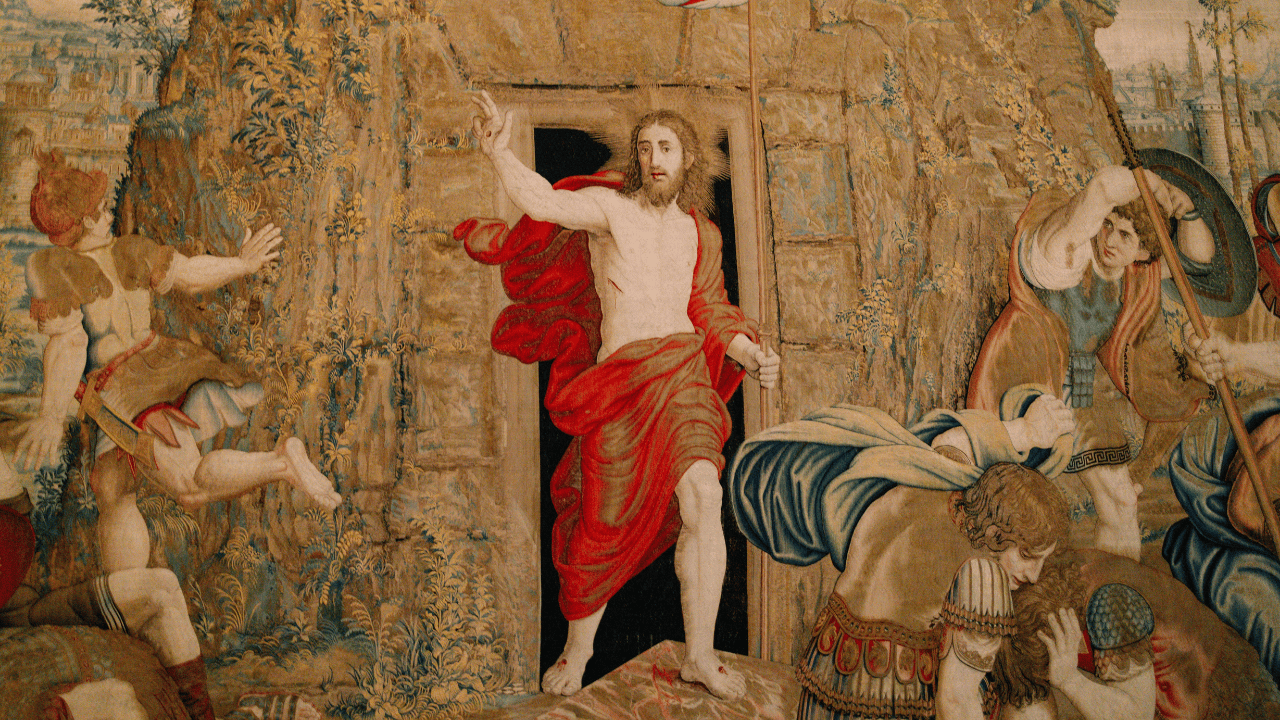
The resurrection is Christianity’s central claim. If it did not happen, as Paul recognizes, “ we are of all people most to be pitied.” Yet to Jesus biographers, Matthew, Mark, Luke and John, there was no doubting the reality of the resurrection. Each paints a different picture of its meaning. To Matthew, the resurrection is the cosmic vindication of Jesus claims of divinity and his place as messiah. Matthew takes aim at Jewish skeptics and rulers. Mark is concerned with the bewilderment and mystery of the empty tomb. Luke is concerned the Jesus connection to fulfilled Old Testament prophesy. John wants us to see the resurrected Lord’s compassion as he interacts with the nascent faith of his troubled disciples. The point of these narratives, and Paul’s commentary later, is that the resurrection is profound and its scope perhaps beyond our immediate comprehension.

